PM KUSUM Scheme: Benefits, Implementation, and Future Prospects
India’s agricultural sector has long been dependent on traditional energy sources like diesel and grid electricity, which often fail to meet the growing needs of farmers. To address these challenges, the Indian government launched the Pradhan Mantri Kisan Urja Suraksha evam Utthan Mahabhiyan (PM KUSUM) scheme.
India’s agricultural sector has long been dependent on traditional energy sources like diesel and grid electricity, which often fail to meet the growing needs of farmers. To address these challenges, the Indian government launched the Pradhan Mantri Kisan Urja Suraksha evam Utthan Mahabhiyan (PM KUSUM) scheme. This initiative focuses on bringing solar energy to the fields, empowering farmers with energy independence and boosting their income through sustainable practices.
At SunGarner, we believe in the power of solar energy to revolutionize agriculture. In this article, we’ll break down the benefits of the PM KUSUM scheme, how it’s being implemented, and what the future holds for farmers and India’s renewable energy sector.
Why is PM KUSUM a Game Changer for Farmers?
1. Energy Independence for Farmers
One of the primary goals of the PM KUSUM scheme is to give farmers control over their energy needs. Traditionally, many farmers have relied on grid electricity or diesel pumps, both of which come with high costs and unreliable supply. Solar pumps, which are encouraged under this scheme, offer a clean, renewable, and continuous energy source, even in remote areas where access to the grid is limited.
By switching to solar energy, farmers can generate their own power, ensuring they have a stable and reliable energy supply to irrigate their crops without being affected by power cuts or rising diesel prices. This newfound energy independence allows farmers to be more productive and efficient in their work.
2. Lower Costs, Higher Savings
Irrigating fields with diesel pumps has been a costly affair for many farmers. Diesel prices fluctuate, and maintaining these pumps can be expensive. With the shift to solar-powered irrigation systems under the PM KUSUM scheme, farmers can drastically cut down on these recurring expenses. The sun’s energy is free, and once the solar pump is installed, operational costs drop significantly.
By saving on diesel and electricity costs, farmers can improve their profitability, ensuring that more of their earnings stay in their pockets. This is a critical step in reducing the financial burden on farmers and promoting sustainable farming practices.
3. Earning Extra Income
The PM KUSUM scheme doesn’t just stop at saving money – it also provides farmers with a way to make more. Farmers who install solar panels on their land can sell any surplus energy they generate back to the grid, creating an additional source of income. This is particularly beneficial for farmers who have unused or barren land, as they can install decentralized solar power plants and sell the electricity generated to the local distribution companies.
This dual benefit of lower costs and extra income improves the financial stability of farmers, making agriculture a more viable livelihood. The opportunity to earn from otherwise unproductive land is a boon for rural communities and can lead to significant economic development in these regions.
4. Environmental Benefits
Switching from diesel to solar not only helps farmers economically but also has a positive impact on the environment. Diesel pumps contribute to air and noise pollution, and they release significant amounts of carbon emissions. Solar pumps, on the other hand, are clean and quiet. They help reduce the agricultural sector’s carbon footprint, which is crucial in the global fight against climate change.
By promoting solar energy, the PM KUSUM scheme supports India’s commitment to renewable energy targets and sustainable development goals. Every solar pump installed under this initiative is a step towards a greener, healthier planet.
5. Stronger Agricultural Sector
Reliable and affordable energy is essential for efficient farming. The PM KUSUM scheme ensures that farmers have a dependable source of power, which can lead to more consistent irrigation, better crop yields, and a stronger agricultural economy. With fewer interruptions in power supply, farmers can focus on maximizing their productivity and growing higher-quality crops.
This stability not only benefits individual farmers but also strengthens the overall agricultural sector in India, making it more resilient and capable of feeding the nation’s growing population.
How is the PM KUSUM Scheme Being Implemented?
The PM KUSUM scheme is divided into three key components to help farmers in different ways:
Component A: Setting up Solar Power Plants
Farmers, or groups of farmers, can set up small solar power plants (up to 2 MW) on their barren or unused land. These plants generate electricity, which can be sold to the local grid. It’s a win-win for farmers who get a steady income from selling electricity while using land that otherwise wouldn’t generate any revenue.
Component B: Solarization of Agricultural Pumps
This component focuses on replacing traditional diesel-powered irrigation pumps with solar-powered ones. Farmers receive financial assistance to install solar pumps that can operate independently from the grid. The government covers a significant portion of the installation cost, making solar pumps accessible to more farmers. With these solar pumps, farmers can water their crops without relying on expensive diesel or inconsistent grid power.
Component C: Grid-Connected Solar Pumps
Under this component, farmers who still use electricity from the grid for irrigation can opt to install solar panels to power their pumps. Any extra electricity generated by the solar panels can be sent back to the grid, allowing farmers to offset their electricity costs and potentially earn extra income from selling surplus power.
Challenges in Implementation
While the PM KUSUM scheme offers tremendous benefits, some challenges have emerged during its implementation:
High Initial Costs – Despite government subsidies, the upfront investment for solar panels and pumps can be a barrier for many farmers, especially smallholders. Many lack access to financing options, which slows adoption.
Limited Awareness – Not all farmers are aware of the benefits of the PM KUSUM scheme or how to apply for it. More targeted outreach programs and awareness campaigns are needed to ensure that more farmers can take advantage of the scheme.
Technical and Maintenance Issues – The installation and maintenance of solar systems require technical expertise, which may not be readily available in all rural areas. Ensuring farmers have access to skilled labor and repair services is crucial for long-term success.
The Future of the PM KUSUM Scheme: What’s Next?
Looking ahead, the PM KUSUM scheme holds enormous potential for transforming Indian agriculture and helping the country meet its renewable energy goals. Here are a few areas where the scheme is expected to have a lasting impact:
1. Wider Solar Adoption
As awareness about the PM KUSUM scheme grows and more financing options become available, we can expect an increasing number of farmers to adopt solar energy. This will lead to greater energy independence for the agricultural sector and significantly increase India’s renewable energy capacity.
2. Enhanced Farmer Income
With more farmers selling surplus electricity to the grid, rural incomes are set to rise. The financial stability provided by this extra revenue stream will strengthen rural economies, reduce poverty, and improve the overall quality of life for farmers.
3. Strengthened Rural Infrastructure
The scheme also encourages the development of rural solar power plants and mini-grids, which will provide electricity to remote areas and improve infrastructure. Better electricity access will lead to more efficient agricultural practices and enhanced productivity.
4. Climate Change Mitigation
The PM KUSUM scheme is a crucial part of India’s strategy to reduce its carbon footprint. By promoting solar energy, the scheme will play a vital role in reducing greenhouse gas emissions from the agricultural sector and helping India meet its climate goals.
Conclusion
The PM KUSUM scheme is an essential step toward a sustainable future for Indian farmers and the country as a whole. By promoting solar energy, it empowers farmers to take control of their energy needs, reduces costs, and opens up new income opportunities. With the potential to significantly reduce carbon emissions, the scheme also aligns with India’s broader renewable energy and climate goals.
At SunGarner, we are committed to supporting initiatives like the PM KUSUM scheme that help farmers adopt solar energy and contribute to a cleaner, greener future. Through continued government support and increased awareness, this scheme has the potential to transform agriculture and make a lasting impact on India’s energy landscape.








_Technology,_Design_Applications.png)
